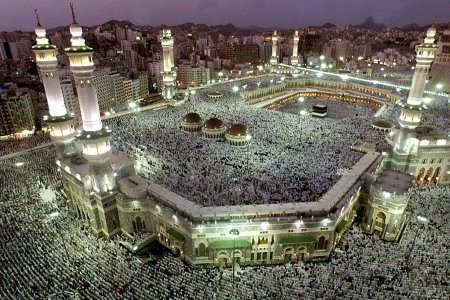
RENAISSANCE OF MUSLIM UMMAH
[Shamim A Siddiqi, New York]
[www.dawahinamericas.com]
INTRODUCTION: Islam is nowhere traceable in the body politics of any land though there are 57 Muslim countries in the world. Muslim Ummah stands discarded, degraded and in a very wretched condition though in numbers it is more than 1.5 billon [1/4th of world population]. Under this situation every sane Muslim on earth is nurturing grave concern over this dilapidated condition of Ummah. Some brothers say let us concentrate on R & D, some cry to have unity in our ranks and files, some suggest to concentrate on modern education, some are making every effort for "Tableegh" of Deen whereas some are struggling to get rid of foreign influence in the internal affair of the Muslim world. I don't blame anyone of them for their respective truncated solution. If we go in depth as a truthful Muslim and Muslimah, the cause of the steep fall of the Ummah is quite different than what appears to most of us.
Just see how lamentably the poet of the East, Allamah Iqbal has summarized the situation of Ummah in a couplet: "Tum Sabhi kuch hu bata'wo ki Muslman Bhi hu" [Translation: "You are every thing but tell: Are you Muslim too?]
Let us dig in the state of Ummah as it stands today. The cause of its fall is a "solitary" one deeply rooted within the Ummah itself. The cure of its Resurrection too is equally simple and manageable provided we have the will to do so.
1. THE GREATEST TRAGEDY: Ummah has lost the Concept of Islam as Al-Deen, the system of life as a whole. It is divided into different sects, different Mazahib, deviated paths: Shiia, Sunni; Hanafi. Maliki, Shafeii, Humbali; Sufisim and its various branches, thereby sticking only to some rituals, some segments of Islam, some concocted dogmas and some illusive beliefs and "Hazar Imam", culminating in many ritualistic forms of worships, involving themselves in: Worshiping forefathers, Pirs, Graves, and Dargha – fighting with each other bigotedly, forgetting, Islam as Al-Deen in this process altogether. ISLAM has just been rendered virtually into a religion as Judaism and Christianity are.
This tragedy does not end here.
Islam is not only a Deen but a Movement and that is totally missing from our day to day life pattern. If Muslims can offer some routine rituals, they are happy as if they have "conquered" Rome. Whereas Islam demands that it must prevail over all the other "Adyan" as ordained by Allah in Al-Tawbah – 33; Al-Fathay – 28 & Al-Suf -9 and had made incumbent upon Ummah to establish "JUSTICE" [Al-Qist] in human society vide verse # 25 of Surah Al-Hadeed
The life long pursuit of Rasulullah (Sallahu alayhi wasallam) confirms it. Whenever he (Sallahu alayhi wasallam) used to meet someone during his (Sallahu alayhi wasallam) contact for dawah Ilallah, he (Sallahu alayhi wasallam) used to invite him with these words: "O the people: Say [Accept] La Ilaha Ilallah, You will be benefited; you will become the master of Arabs and the "Ajam" [the non-Muslim world] will come under you domination; and when you die, you will also be the master in Jannah". This was his (Sallahu alayhi wasallam) message of DI all along 13 years in Makkah as narrated by Ibne Hisham in Seerah of Rasulullah (Sallahu alayhi wasallam), Balazari in "Fatuhul Baladan" and Ibne Katheer in "Albadayah wa Alnahayah"
I request the reader to think over the situation that just by saying the Kalimah "La Ilaha Ilallah", how one will become master of Arab and Ajam unless he/she struggles for it for the whole of his/her life. In fact, the Kalimah was the most Revolutionary Political Slogan of Rasulullah. It would never keep a Muslim or Muslimah idle in his home if he accepts and starts rightly to comply with what this Kalimah demands.
The Kalimah motivates him/her to get up, call the people to the fold of Allah, organize those who accept it into a Jama'ah, trim and polish their character, and struggle jointly and concertedly towards establishing the authority of Allah on self, family and society accordingly. A Muslim cannot feel rested unless his/her Dawah efforts engulf the entire humanity. That is what Rasulullah (Sallahu alayhi wasallam) expressed in his (Sallahu alayhi wasallam) statement when he (Sallahu alayhi wasallam) addressed his (Sallahu alayhi wasallam) uncle Abu Talib and said: "If the idolaters put sun in my right hand and moon on my left, I will never give up this work [of DI] till Allah's Deen becomes dominant or I give up my life in that pursuit".
Islam is a Deen and a Movement but Ummah has lost this Vision, This is our # One Tragedy.
2. Along with the bifurcation of Muslim community into hundreds of sects and by-sects, Ummah has lost its position of "Ummatun Wasata" and the "Best of Nations" as ordained by Allah in Verses # 143 of Al-Baqarah and Verses # 104 & 110 of Surah Al-Imran. In the midst of this doldrums, Ummah has lost its sense of priorities as "what to do and how to do"; "from where to start and how to start" the process of its Resurrection.
2. DAWAH ILALLAH – THE ONLY MEANS TO ACCOMPLISH THE MISSION OF "LA ILAHA ILLALAH":
* When Rasulullah (Sallahu alayhi wasallam) came out of the Cave of Hera, he (Sallahu alayhi wasallam) was ordained in the very second Wahi: "Rise and Warn; and Glorify thy Lord". Along with it, Kalimah "La Ilaha Ilallah", was entrusted to him (Sallahu alayhi wasallam) as the logical means to call the humanity to accept His authority.
Now one must envision that what Rasulullah (S) was thinking in the Hera: about the peace, human rights, insecurity, poverty, bloodshed and constant fear of violence. However, none of these burning issues he (Sallahu alayhi wasallam) took after his(Sallahu alayhi wasallam) assignment as the Messenger of Allah. His (Sallahu alayhi wasallam) main concern was now to correct the man, the epic center of human troubles: If men and women are corrected, rejuvenated, imbibed with Allah-consciousness [Taqwah] and a trustworthy character with a constant fear of accountability after death, every thing will be Ok and streamlined in the society. Accordingly, he (Sallahu alayhi wasallam) resorted to two most natural steps to augment his (Sallahu alayhi wasallam) efforts of Dawah Ilallah [DI]:
I. Rasulullah (Sallahu alayhi wasallam) started his (Sallahu alayhi wasallam) campaign of Dawah contacts from person-to-person with his (S) close relatives, friends and the citizens of Makkah with one message as quoted above. Those who responded to his (Sallahu alayhi wasallam) call, he (Sallahu alayhi wasallam) organized them into a Jama'ah [organization], trim and polished their individual character. In thirteen years of Makkah, through his (S) hard and constant efforts, he (Sallahu alayhi wasallam) got just 124 persons in the fold of Islam [Ibne Hisham has listed their blessed name individually in his Seerah (Sallahu alayhi wasallam)]. This was the INTENSIVE DAWAH WORK of Rasulullah (Sallahu alayhi wasallam) in Makkah. This process continued in Madinah too after Hijrah unabated.
II. Beside, this individual contacts, Rasulullah (Sallahu alayhi wasallam) used to meet and address the trade caravan in the markets of Makkah and in its vicinity and with different tribes at Mina during Hajj with the same message as quoted above. Thus, his (Sallahu alayhi wasallam) message was reaching or spreading to almost all the tribes of Arabia during Hajj season. Some accepted his (Sallahu alayhi wasallam) mission of DI and some differed. I have given a brief account of these responses in my book: "Methodology of Dawah". This was the EXTENSIVE DAWAH WORK of Rasulullah (Sallahu alayhi wasallam), introducing and spreading the Deen of Allah to different nooks and corners of the country.
Both Intensive and Extensive Dawah works were and are complementary to each other. The means have changed with the change of time but the methods and the process of DI remains the same.
3. Building the Requisite Team of Da'ees in the Context of Modern world -
Briefly speaking, A Da'ee in the field must have:
* Clarity of vision and conviction in Mission;
* Acquired the working knowledge of Islam;
* Understanding of the country, its people, and their problems with Islamic
solution;
* A Trustworthy character;
* Developed the habit of sacrificing time, talents and resources for the Mission;
* Willingness to work collectively with the Movement or the Jama'ah
[I have elaborated these fundamental prerequisites of a Da'ee Ilallah in my paper: "Importance of Dawah in America & Our Obligation". It is available on my Website: WWW.dawahinamericas.com under Section "B" – Islam as a Movement]
4. RENAISSANCE OF MUSLIM UMMAH - HOW ?
I. Clarity of the Mission of Rasulullah (Sallahu alayhi wasallam) – What was his (Sallahu alayhi wasallam) mission and how he (Sallahu alayhi wasallam) did it?. Its details can be seen in my paper: "Mission of Muhammad (Sallahu alayhi wasallam) – How He (Sallahu alayhi wasallam) Accomplished it?" on my Website under Section "B" as referred above.
II. Dawah Strategy – For different people, different region at local, national and International levels: Separately for Muslims and Judeo-Christian-Pagan world with a Global Strategy at the top. This I have discussed in detail in my paper: "Who are our Addressees & How to address them?" It is on Website under Section "B" as referred above
III. Comprehensive Re-awakening Program for Muslim countries to make them Conscious Muslims and Muslimah on the basis of Surah Al-ASR;
IV. Building Effective Teams of dedicated and committed Da'ees on the pattern Rasulullah (Sallahu alayhi wasallam) did. We have to build these teams of Da'ees in different languages, regions and cultures, bearing trustworthy character and missionary zeal;
V. Developing Model Muslim Communities [MMC] in different parts of the Muslim world and in the West too, inviting non-Muslims to be their guest at least for 3 days and observe the practical model of Islamic life in action in modern age. It would be one of the best TOOLS of Dawah Ilallah. These MMC will be basically inhabited by movement-oriented brothers and sisters [DI], bearing a trustworthy character and demonstrating to the world as how to live, act and behave like conscious Muslim and Muslimah in the context of the modern world.
VI. Organizing the Institution of Zakah in the Muslim world locally, nationally and Internationally to cater the needs of the poor, the needy and the "have-nots" in the Muslim countries FIRST then Globally – making Islam Extremely attractive to the deprived and oppressed people of the world and fulfilling the Global Financial Needs of DI under wider connotation of "Fi Sabeel Allah"; [ Its details can be seen in my paper "Zakah- A Guaranteed Solution For Have-nots" on my Website under Section "A" – Islam As A Way of life [Al-Deen]'
VII. Preparing vast quantity of Effective Dawah Literature – Print, Video, Audio and Internet, in different languages in millions and millions to flood the Muslim and non-Muslim world to encounter the anti-Islam propaganda and presenting Islam positively to humanity at large as an alternate way of ;life. It would be the best TOOL of Muslim Da'ees in the field of Dawah Ilallah.
CONCLUSION: If Muslim Ummah resolves to go along with it and is really interested to resurrect its fate, it can do it very easily as all the means and resources are at its disposal. The only things that Muslim Ummah and its leadership lack are: the "WILL to do it ", "Fear of Allah, and "Accountability in Akhirah" along with it the haunting "Fear of death" and "Love of this world" i.e. "Wahan" as described by Rasulullah (Sallahu alayhi wasallam) in a Hadith.
May Allah protect our Muslim leadership with these illusionary images! Amen!





















